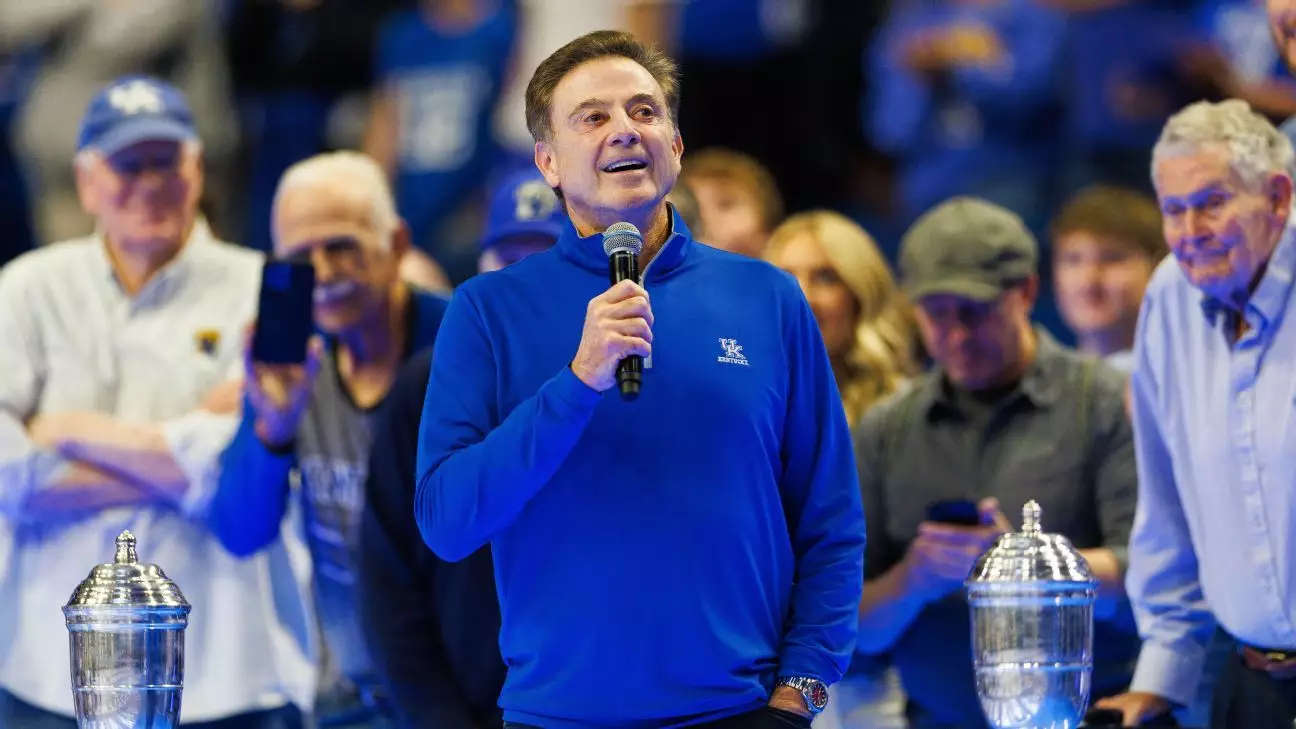Rick Pitino, a name synonymous with college basketball, found himself enveloped in a wave of nostalgia as he returned to Kentucky’s Rupp Arena for the Big Blue Madness event after nearly thirty years. The evening marked a significant reunion, not only between the coach and the program he once revered but also between him and the passionate Kentucky fanbase, who celebrated him warmly. Pitino, now at the helm of St. John’s University, donned a Kentucky sweater that symbolized both his storied past and complicated relationships with the institution.
The arena echoed with cheers as Pitino took the floor, a stark contrast to previous visits as head coach of Louisville, where he often faced a frosty reception. The circumstances surrounding his return were significant; the hiring of Mark Pope, captain of Pitino’s 1996 championship team, reignited the fire of affection for the coach.
Pitino’s emotional speech further solidified the night’s significance. Standing before the throngs, he expressed profound gratitude for his time at Kentucky, referring to it as “Camelot.” His heartfelt proclamation, “I am so happy to be back,” resonated deeply with both fans and former players present. For eight glorious years, Pitino cast a long shadow over the program, a legacy now shackled with the weight of personal hardship and controversy, especially given the tumultuous chapters that followed his departure.
Let us not forget the coach’s complicated relationship with the Kentucky faithful. After achieving unprecedented success at Kentucky, including the 1996 national championship, Pitino ventured into the NBA but returned to college basketball’s spotlight with Louisville. His decision to coach a rival team undoubtedly ignited anger and resentment among Kentucky supporters, many of whom viewed it as a betrayal. His acknowledgment of the backlash at his Louisville introduction revealed the difficult line he had to tread between two passionate fanbases.
The rivalry between Kentucky and Louisville has always been intense, characterized by a mix of passion, enthusiasm, and outright animosity. When Pitino was at the forefront of that rivalry, he often referred to it as “pure hatred,” reflecting the deep-seated emotions both teams evoked in their respective supporters. Incidents like the infamous gesture he made towards Kentucky fans only exacerbated tensions, embedding the rivalry even deeper into their collective consciousness.
But as time has softened some of these memories, the dynamics slowly began to shift. Fast forward to present-day Pitino, whose return was less an act of conquering the past and more an olive branch toward reconciliation and unity. His association with Pope seemed to facilitate this reconciliation, suggesting that even in sports, relationships evolve and grow.
Pitino’s endorsement of Mark Pope was particularly poignant. Lashings of nostalgia intertwined with hope as he expressed faith in Pope’s ability to guide Kentucky back to its former glory. With Kentucky basketball facing challenges marked by early tournament exits, Pitino’s words came as a beacon of optimism. He articulated that Pope embodies the essence of Kentucky basketball, reinforcing the idea that the true legacy lies beyond individual triumphs—the program itself is held above all.
As Rick Pitino took a moment to absorb the warmth of the crowd and reflect on the path he’s traveled, it became clear that this return was not merely about individual acclaim but represented something larger—a chance to heal past wounds and celebrate the rich tapestry of shared history.
By revisiting Kentucky in this light, Pitino unlocked the potential for new beginnings. In an era when the line between rivalry and camaraderie appears stark, moments like these provide sweet reminders of how sports unify us. The future is no longer written in the shadows of bitter rivalries but instead illuminated by shared goals and collective memories, as the legend of Pitino finds renewal in the annals of Kentucky basketball, bridging a cherished past with a hopeful tomorrow.

Leave a Reply